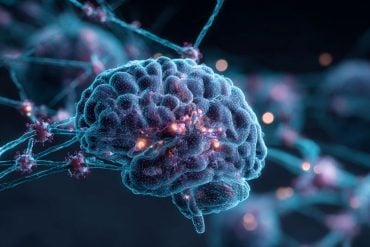Summary: Cardiff University researchers report a molecule in a common medication used to treat tapeworm has shown to be effective in enhancing the PINK1 protein and slowing the progression of Parkinson’s disease.
Source: Cardiff University.
Researchers at Cardiff University, in collaboration with the University of Dundee, have identified a drug molecule within a medicine used to treat tapeworm infections which could lead to new treatments for patients with Parkinson’s Disease.
Parkinson’s disease is a long-term degenerative disorder of the central nervous system that, according to the charity, Parkinson’s UK, affects one person in every 500. That means an estimated 127,000 people are currently living with Parkinson’s disease in the UK alone.
Over the last decade or so, researchers striving to find a cure for this debilitating disease have focused their attention on a protein found in the human body known as PINK1. It’s understood that the malfunction of this protein is one of the leading causes of Parkinson’s Disease.
Several studies have suggested that discovering a drug, which is capable of enhancing the function of PINK1, could be a significant step in halting neurodegeneration and therefore slow down or even treat Parkinson’s disease.
With this knowledge in mind, researchers at Cardiff and Dundee Universities have discovered that a drug traditionally used to treat tapeworm infections, named Niclosamide, is also an effective activator of the PINK1 protein.

Furthermore, the research, funded by The Welcome Trust and the MRC, revealed that Niclosamide and some of its derivatives could enhance PINK1 performance within cells and neurons. This has given the researchers reason to believe that this drug could provide new hope for Patients living with Parkinson’s Disease.
The findings of this research are detailed in “The Anthelmintic Drug Niclosamide and its Analogues Activate the Parkinson’s Disease Associated Protein Kinase PINK1” which has been published this week.
Dr Youcef Mehellou from Cardiff University’s School of Pharmacy and Pharmaceutical Sciences, who co-lead the study, said, ‘This work represents the first report of a clinically used drug to activate PINK1 and may hold promise in treating Parkinson’s disease. We will now take our findings to the next level by evaluating the ability of Niclosamide to treat Parkinson’s Disease in disease models. This is an exciting stage of our research and we are positive about the long term impact it could have on patients’ lives.’
Source: Dr Youcef Mehellou – Cardiff University
Publisher: Organized by NeuroscienceNews.com.
Image Source: NeuroscienceNews.com image is credited to the researchers.
Original Research: Abstract for “The Anthelmintic Drug Niclosamide and its Analogues Activate the Parkinson’s Disease Associated Protein Kinase PINK1” by Erica Barini, Ageo Miccoli, Federico Tinarelli, Katie Mulholand, Hachemi Kadri, Farhat Khanim, Laste Stojanovski, Kevin D Read, Kerry Burness, Julian J Blow, Youcef Mehellou, and Miratul Muqit in ChemBioChem. Published online December 10 2017 doi:10.1002/cbic.201700500
[cbtabs][cbtab title=”MLA”]Cardiff University “Tapeworm Drug May Help in Fight Against Parkinson’s.” NeuroscienceNews. NeuroscienceNews, 12 December 2017.
<https://neurosciencenews.com/niclosamide-parkinsons-8167/>.[/cbtab][cbtab title=”APA”]Cardiff University (2017, December 12). Tapeworm Drug May Help in Fight Against Parkinson’s. NeuroscienceNews. Retrieved December 12, 2017 from https://neurosciencenews.com/niclosamide-parkinsons-8167/[/cbtab][cbtab title=”Chicago”]Cardiff University “Tapeworm Drug May Help in Fight Against Parkinson’s.” https://neurosciencenews.com/niclosamide-parkinsons-8167/ (accessed December 12, 2017).[/cbtab][/cbtabs]
Abstract
The Anthelmintic Drug Niclosamide and its Analogues Activate the Parkinson’s Disease Associated Protein Kinase PINK1
Mutations in PINK1, which impair its catalytic kinase activity, are causal for autosomal recessive early onset Parkinson’s disease (PD). Various studies have indicated that the activation of PINK1 could be a useful strategy in treating neurodegenerative diseases such as PD. Herein, we show that the anthelmintic drug niclosamide and its analogues are capable of activating PINK1 in cells via reversible impairment of the mitochondrial membrane potential. Using these compounds, we demonstrate for the first time that the PINK1 pathway is active and detectable in primary neurons. Our findings suggest that niclosamide and its analogues are robust compounds to study the PINK1 pathway and may hold promise as a therapeutic strategy in Parkinson’s and related disorders.
“The Anthelmintic Drug Niclosamide and its Analogues Activate the Parkinson’s Disease Associated Protein Kinase PINK1” by Erica Barini, Ageo Miccoli, Federico Tinarelli, Katie Mulholand, Hachemi Kadri, Farhat Khanim, Laste Stojanovski, Kevin D Read, Kerry Burness, Julian J Blow, Youcef Mehellou, and Miratul Muqit in ChemBioChem. Published online December 10 2017 doi:10.1002/cbic.201700500






